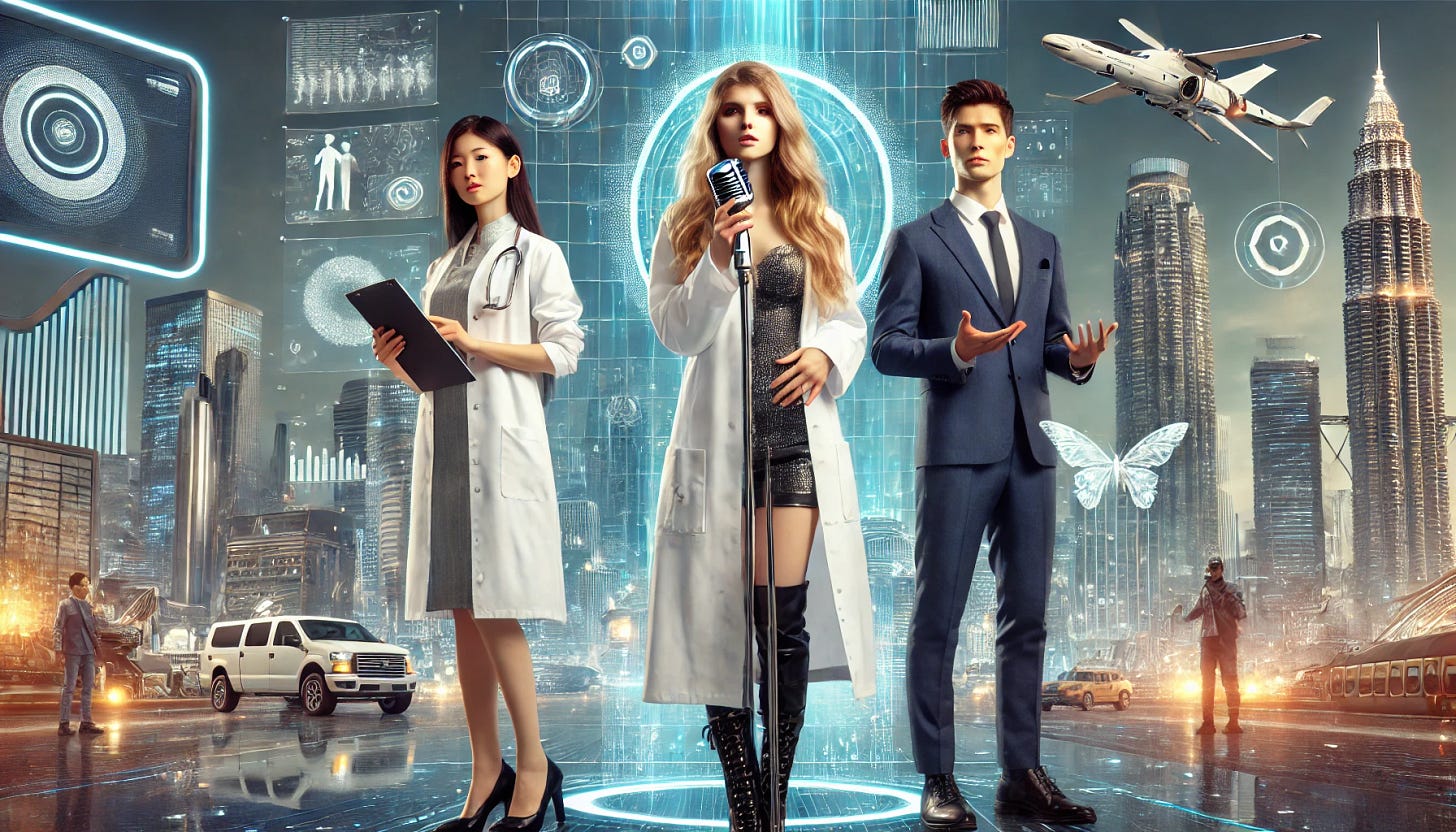Why AI has changed nothing and everything
Two years on we have a powerful and exciting technology that still feels
As Timbaland rapped at the start of Aaliyah’s Try Again, it’s been a long time, shouldn’t have left you. Getting out of habits is, it seems, easier than restarting.
Dispash 2.0? Maybe Dispash 1.3. Onwards.
Everything new is old even with AI
It's nearly two years since Chat-GTP3 was released to the public. And two years is not an unreasonable time period to ask, "so what's actually changed?" Our concept of what AI is and can do has shifted, even though we've been using AI in our day-to-day for several years. Alexa, Excel, autocorrect. All AI.
And yes, AI can create computer games and coding in just a few minutes. Some of the capabilities of video and image tools like Sora and Claude are breathtaking. But, again, what does this actually mean? Two years in, there's three main answers. Firstly, not very much. It's an exciting transformative product that is still looking for a use case, or a platform to be built on rather than the answer in and of itself.
Secondly, it's created a lot of dirge. The lowest common denominator least defensible businesses such as stock photography or cheap average copywriters on Upwork have a hard job explaining why their proposition is superior to a quick machine generated output. And the less salubrious lines or work that already relied on cheap labour, such as click farms and search-bait, have an endless supply of content that can be used to do everything from generating advertising revenue to sowing disinformation.
It’s unlikely that AI engineers created tools with Prawn Jesus in mind. Media outlets aren't necessarily dying because their product is bad, but because eyeballs and murky digital advertising is being directed away to bad actors who don't play by the same rules and don't care.
Thirdly, anybody who is doing anything interesting or useful with AI is probably keeping it quiet, as it involves using internal data and internal business cases. This almost certainly involves machine learning or a combination of machine learning and generative AI. Business questions that can be analysed and answered through quicker automated outputs are valuable. Generative AI is… sort of valuable at a consumer level, but still mostly with business rather than personal use. The big impressive, transformative work probably won’t be shared anytime soon.
AI for change sake or AI for market sake?
Some companies feel pressured to incorporate AI into their products due to investor or market demands. This leads to implementations like Microsoft's half-formed assistant in Bing, Google recommending people eat rocks or LinkedIn's AI summaries.
Generative AI and large language models are impressive, but the potential for error ranges from negligible to serious. An AI hallucination in healthcare could be far more dangerous than one in fashion. Military use of AI requires a higher standard than stock video generation.
The use cases for AI will evolve. Using LLMs and generative AI for social media, copy, or creative work saves time but isn't game-changing. AI's ability to edit stock images is helpful but now just part of Adobe's product stack.. To reframe an old philosophical question: at what point does AI just become software?
Big leaps will almost certainly come but a lot of the initial value is found in doing what humans can do but much quicker. A chocolate manufacturer may have difficulty enabling GenAI into their actual product - human tastebuds are one area an AI will struggle with - but AI can optimise their supply chain or identify potential market opportunities for new flavours by looking at data patterns.
The best ideas for AI probably haven’t been thought of yet or don’t have the infrastructure to execute them well enough. The idea of TikTok isn’t wildly dissimilar to early startups like Justin.tv or Seesmic, but it needed a combination of 5G, better mobile camera and video features, and mobile adoption at scale that wasn’t available in the late 2000s.
Where AI is making progress
So what does that mean? Realistically, the most groundbreaking advances will come from businesses that have the money, skills and datasets to shift paradigms.
Drug pipelines, for example, are something of an intelligent crapshoot and take years to reach the market. Large datasets are ripe for predictive models given the strength of AI lies in making intelligent guesses at scale based on past data.
Market research, especially in B2B where access to decision makers is both expensive and time consuming, has potential to be cheapened and sped up thanks to synthetic data. Transcribing and identifying patterns from voice recordings suddenly becomes much easier. AI analysis has the ability to suggest trends from data researchers may not have considered.
But it’s harder to know exactly what effect it will have on culture. Tech enthusiasts who suggest that viewers can write and create their own versions of their favourite shows overlook the fact that this is also a faff and most people don’t have that level of fandom or time (although there will almost certainly be a business model around advanced fanfic).
And while AI could write songs that sound like they belong on Charli xcx’s Brat, the cultural conversation around brat would be entirely absent. Maybe this will matter or perhaps it won’t. Some pop music is successful in appealing to the widest possible tastes, while other aspects come from experimentation. Auto-tune and vocoder technology had been around for several years but Cher and T-Pain both showed the creative potential.
Ultimately, these are cultural questions, not AI questions. Just as social media is now seen as tech rather than internet technology, AI will become just another part of the tech landscape. Tomorrow's tech will be different, yet familiar. Plus ça change.
Interesting reads
Links to all in the sub-headlines
Chat GPT likes to fight. For military AI reseachers that’s a problem (Tech Brew)
Of course military divisions will see the potential in AI. At the moment, though, it seems it prefers to take the Death or Glory route to victory. And ethical considerations don’t really come into play for machines, only a guess on what it thinks humans will do. That’s a similar problem for AI, ethics and automated driving.
AI has become a technology of faith (The Atlantic)
Charlie Warzel speaks to Sam Altman and Arianna Huffington about their non-existent AI healthcare platform Thrive AI Health in a healthy dose of scepticism. “Neither Altman nor Huffington had an answer to my most basic question—What would the product actually look like?” AI has huge potential in healthcare but, as Warzel notes, the ethics and questions seem to back a backseat to messianic beliefs.
The church of Roblox: how young Filipino Catholics are building more inclusive spaces (Rest of the World)
Religion, Roblox style. It makes sense that spin off sub communities of mainstream activity would appear in virtual worlds. Religion makes more sense in the metaverse than branded stores, even if this is essentially Catholicism Livejournal 3.0.
The media for equity model is worth closer inspection (Ben Shepherd’s Signal)
“Media’s core product is a perishable one. Unsold inventory simply perishes if not sold, it cannot be warehoused but it can be reappropriated in a way that delivers better financial return than bonus or low yield distress.” I don’t know a single media owner who actually sells media at the rate card price. There’s a whole article in that, but one suggestion from analyst Ben Shepherd is to sell media for equity. That’s a different model, but as retailer are now becoming media owners creating more inventory, some businesses probably need a different approach.
Thanks for making it this far. Please share or subscribe if you like The Dispash or think somebody else might like it. Playing us out this week: Mood Ring by Dehd. Poetry is an album that’s rarely been off my headphones, and this irresistible single is a stand out. Lo-fi, melodic and the sound of a band at the top of their game.





